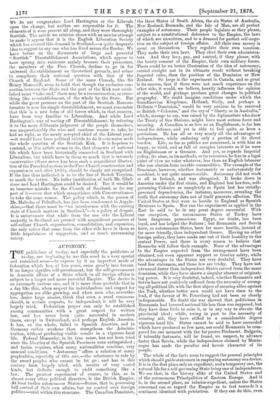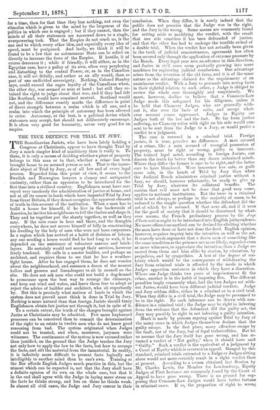AUTONOMY.
THE politicians of to-day, and especially the publicists of to-day, are beginning to use this word in a very special and restricted sense—to express by it an imperfect mode of federation which has, of late years, come greatly into favour. It no longer signifies self-government, but the self-government in domestic affairs of a State which in all foreign affairs is subject to a larger and more powerful Empire. The device is an extremely curious one, and it is more than probable that in a day like this, when respect for individualism and respect for aggregation are alike growing, and when men who, neverthe- less, desire large armies, think that even a rural commune should, in certain respects, be independent, it will be very largely tried. Federation proper can only be established among communities with a great respect for written law, and has never been quite successful in modern times, except in Switzerland, and perhaps English America. It has, on the whole, failed in Spanish America, and in Germany rather weakens than strengthens the Adminis- tration, without producing visible results in a vigorous local life. Federal Monarchy, in its true sense, has not been tried since the liberties of the Spanish Provinces were extinguished ; and fusion requires, when many nationalities combine, very unusual conditions. " Autonomy " offers a solution of many perplexities, especially of this one,—the reluctance to rule by the sword peoples who cannot be let go ; and has in this century been largely tried, with results of very varied kinds, but definite enough to yield something like a law. The greatest experiment of course, in this, as in almost every other political direction, is the British Empire. At least twelve autonomous States—States, that is, possessing full control of their own affairs, but no control over foreign politics—exist within this structure. The Canadian Dominion, the three States of South Africa, the six States of Australia, New Zealand, Bermuda, and the Isle of Man, are all perfect examples of autonomy. Their people legislate as they please, subject to a constitutional deference to the Empire, the laws of which are unwritten, and to a demand for perfect self-nega- tion on the subject of foreign affairs. All their own money is spent on themselves. They regulate their own taxation. They make their own laws. They elect their own administra- tors. And they levy, pay, and control, if they please, with the hearty consent of the Empire, their own military forces. There could be no better illustration of the idea of autonomy, carried straight out to its ultimate result without breaking Imperial rules, than the position of the Dominion or New Zealand. So large is the experiment in Canada, and so great is its success, that if there were not much experience on the other side, it would, we believe, heavily influence the opinion of the world, and perhaps produce great changes in political geography. We could imagine conditions under which the Scandinavian Kingdoms, Holland, Sicily, and perhaps a Hellenic "Dominion," would be very anxious to be received as British " Colonies," and the cry of " liberty as in Australia," which, strange to say, was raised by the diplomatists who drew the Treaty of San Stefano, might have most serious force and meaning. A Canadian is as free as an Englishman, is far less taxed for defence, and yet is able to feel quite as keen a patriotism. He has all or very nearly all the advantages of independence, while enduring only a portion of its direct burden. Life, as far as politics are concerned, is with him as happy, as vivid, and as full of complex interests as if he were an Englishman or a German. And yet, as regards Imperial policy, its aims, or its methods, or its resources, he has in a legal point of view no voice whatever, less than an English labourer who can abstain from taxable commodities. The example of the Dominion, however, whether fortunately or unfortunately for mankind, is not quite unanswerable. Autonomy did not work at all in Ireland, and was abrogated. It broke down in America under the first strain, and England lost her free, self- governing Colonies as completely as Spain lost her strictly- governed dependencies, the instance, moreover, revealing the truth that autonomy does not of itself generate affection. The United States at first were as hostile to England as Spanish Mexicans to Spain. Nor can the experiment as applied in the East be said to be in any great degree successful. With one exception, the autonomous States of Turkey have been dangerous possessions. Egypt, no doubt, has been loyal, and has helped the Sultans ; but Roumania and Servia have, as autonomous States, been far more hostile, instead of far more friendly, than independent Greece. Having no other foreign policy, they have made one out of their hostility to the central Power, and there is every reason to believe that Roumelia will follow their example. None of the advantages to the Empire expected from the arrangement have been obtained, not even apparent support or frontier safety, while the advantages to the States are very doubtful. They have bred few statesmen, and those few are tricky. They have not advanced faster than independent States carved from the same dominion, while they have shown a singular absence of originat- ing power. It is very doubtful, indeed, whether Roumania and Servia have not positively suffered from the necessity of arrang- ing all political life with the first object of securing allies against the Turk, whether better men would not have risen to the lead, if the favour of St. Petersburg had not been so clearly indispensable. No doubt the war showed that politicians in Roumania had lowered national life less than was supposed, but they have done little to raise it, or in any way to elevate the provincial ideal ; while, owing in part to the necessity of securing aid, they have stifled to a considerable degree vigorous local life. States cannot be said to have succeeded which have produced so few men, nor could Roumania be com- pared for one moment with the far poorer Piedmont. Bulgaria, if tolerably fortunate, will be found, we suspect, to advance faster than Servia, while the independence claimed by Monte- negro has made the peculiar and heroic character of its people.
The whole of the facts seem to suggest the general principles which should guide statesmen in employing autonomy as a device. It is in the first place only an expedient, and a temporary one, the natural life for a self-governing State being one of independence. We see that, in the history alike of the United States and of the autonomous Principalities of Eastern Europe. And it is, in the second place, an inferior expedient, unless the States concerned can so regard the Empire as to feel towards it a sentiment identical with patriotism. If they can do this, even for a time, then for that time they lose nothing, not even the stimulus which is given to the mind by the largeness of the politics in which one is engaged ; but if they cannot, then the minds of all their statesmen are narrowed down to a single, overpowering task. That the Empire do not crush us, is the one end to which every other idea, and especially every idea of speed, must be postponed. And lastly, we think it will be found to be a law that no autonomous State can be relied on directly to increase the force of the Empire. If hostile, it of course decreases it ; while if friendly, it will either, as in the Egyptian case, have a policy of its own, often very perplexing and disturbing to the central Power, or, as in the Canadian case, it will act fitfully, and rather as an ally would, than as part of one undivided sovereignty. Nothing, Colonel Stanley says, could exceed the eager loyalty of the Canadians when, the other day, war seemed so near at hand ; but still they re- tained the right to judge about that war, and if they had felt like Scotland, would have remained neutral. Scotland would not, and the difference exactly marks the difference in point of direct strength between a realm which is all one, and a realm into which the principle of autonomy has been allowed to enter. Autonomy, at the best, is a political device which statesmen may accept, but should not deliberately encourage. It is often very good for humanity, never very good for an empire.































 Previous page
Previous page